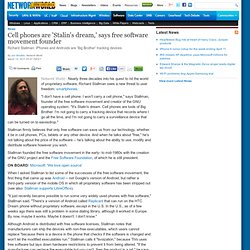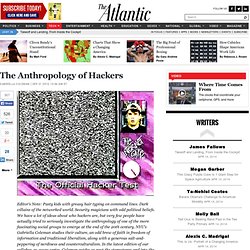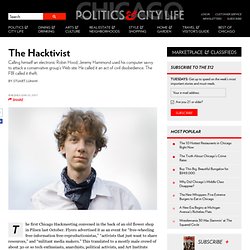

Cell phones are 'Stalin's dream,' says free software movement founder. Nearly three decades into his quest to rid the world of proprietary software, Richard Stallman sees a new threat to user freedom: smartphones.

"I don't have a cell phone. I won't carry a cell phone," says Stallman, founder of the free software movement and creator of the GNU operating system. "It's Stalin's dream. Cell phones are tools of Big Brother. I'm not going to carry a tracking device that records where I go all the time, and I'm not going to carry a surveillance device that can be turned on to eavesdrop. " Stallman firmly believes that only free software can save us from our technology, whether it be in cell phones, PCs, tablets or any other device. To continue reading, register here to become an Insider It's FREE to join Network World - Nearly three decades into his quest to rid the world of proprietary software, Richard Stallman sees a new threat to user freedom: smartphones.
ON BOARD: Microsoft: 'We love open source' Ironically enough, Stallman was speaking to me on a cell phone. Technology - Gabriella Coleman - The Anthropology of Hackers. Editor's Note: Pasty kids with greasy hair typing on command lines.

Dark villains of the networked world. Security magicians with odd political beliefs. We have a lot of ideas about who hackers are, but very few people have actually tried to seriously investigate the anthropology of one of the more fascinating social groups to emerge at the end of the 20th century. NYU's Gabriella Coleman studies their culture, an odd brew of faith in freedom of information and traditional liberalism, along with a generous salt-and-peppering of nerdiness and counterculturalism. In the latest edition of our syllabus-as-essay series, Coleman guides us past the stereotypes and into the many hideouts and projects of the hacker underground. A "hacker" is a technologist with a love for computing and a "hack" is a clever technical solution arrived through a non-obvious means.
Week One: Introductions and the MIT Hackers Week Two: The Craft and Liberalism of Hacking Week Three: Phreaking Week Thirteen: Nerds A lot. The Hacktivist - Chicago magazine - July 2007. (page 1 of 3) The first Chicago Hackmeeting convened in the back of an old flower shop in Pilsen last October.

Flyers advertised it as an event for “free-wheeling free-information free-reproductionistas,” “activists that just want to share resources,” and “militant media makers.” This translated to a mostly male crowd of about 30 or so tech enthusiasts, anarchists, political activists, and Art Institute students, who lounged around on old couches. When conversation lulled, some hoodie-wearing geeks fiddled at their keyboards, playing an online form of Capture the Flag with friendly hackers at concurrent meetings in Barcelona and Santiago. A man wearing dreadlocks named Ben Buckley moderated the gathering.
It wasn’t just bravado. That evening, I caught up with Hammond in front of the flower shop. The word “hacker” conjures up visions of geeky teenagers who steal identities and credit cards, who wield technical knowledge to sow mayhem and chaos. What, then, is a hacktivist? Share. Hackers, le cinquième pouvoir - Nouvelles technos.
Telecomix.